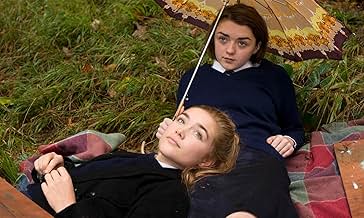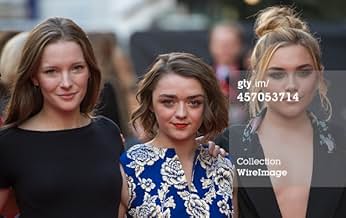En 1969, en un estricto colegio femenino, la carismática Abbie y la intensa Lydia son mejores amigas. Tras una tragedia, las estudiantes empiezan a desmayarse como si de una epidemia se trat... Leer todoEn 1969, en un estricto colegio femenino, la carismática Abbie y la intensa Lydia son mejores amigas. Tras una tragedia, las estudiantes empiezan a desmayarse como si de una epidemia se tratase.En 1969, en un estricto colegio femenino, la carismática Abbie y la intensa Lydia son mejores amigas. Tras una tragedia, las estudiantes empiezan a desmayarse como si de una epidemia se tratase.
- Dirección
- Guionista
- Elenco
- Premios
- 3 premios ganados y 5 nominaciones en total
- Titch
- (as Rose Caton)
- Dirección
- Guionista
- Todo el elenco y el equipo
- Producción, taquilla y más en IMDbPro
Opiniones destacadas
A psychological contagion enabling the exploration of sexuality, moulded by misty melodrama against an autumnal period backdrop. Disturbingly beguiling in nature, through metaphorical body possessions that highlight supernatural elements within the obtrusive sexual motives. Morley, for the most part, captivates when allowing her acting talent to shine through. An innocently naive Williams bravely controlling every scene in her leading role as a psychologically deterred student whom seemingly is a catalyst for the hysteria breakouts. Hospitalised, psychoanalysed and actively withdrawn from therapy, the spells of hysteria are never elaborated. An unexplainable mass psychogenic illness. Morley's intent in ambiguity enables her ostentatious narrative to visualise sexualisation. Hormonal chemicals invading the bloodstream and controlling the mind. A possession, if you will.
Conversely, her screenplay resorts to ethereal poetry and psychedelic narration, emphasising the connectivity between these girls. Unfortunately, several conversational scenes spoon-feed proposed metaphors for the assurance of acknowledgement, most notably the one-sided therapy session that Lydia and her friends endure. Diminishing the bold interpretations that preceded the conclusive act almost indefinitely.
Then the final ten minutes commence and Morley outwardly encounters her own spell of hysteria. The tone alters. The mood unequivocally changes. The pace quickens. She dabbles into darker subjects, a territory that heavily contrasts with the predominantly mystifying narrative. The virginal Lydia interrogating her neglectful agoraphobic mother regarding her father, whilst developing an incestuous relationship with her brother. Discovering her true roots, subsequently offering a hereditary reasoning for her mental instability. It's at this point where Morley loses that tight narrative control. Explicitly presenting a shallow explanation that manages to resolve familial turmoil in a matter of minutes, allowing the supernatural aura to dissipate. Not to mention how under-utilised and misdirected Peake was. Fortunately Pugh's illuminatingly perfect performance makes up for lost talent. The editing imaginatively strings various images together during rapid flashback scenes, which proved effective for the most part. Thorn's soundtrack however was too audacious and overpowering, likening The Falling to a casual summer school trip rather than an existential piece of art.
Morley is a credible director, and The Falling is one feature that uniquely tackles a variety of subjects in a mesmerisingly imaginative manner. Its fundamental issues however are situated in its inappropriate climax and misplaced technicalities that allow the narrative to repetitively faint far too often.
Set in a 1969 girls school, when the promiscuous student Abbie, played by Florence Pugh, accidentally gets pregnant, she begins to suffer from fits of fainting seemingly at random. Her best friend Lydia, played by Williams, deals with the consequences after the epidemic spreads across the school with girls fainting out of control. The film appears to be a story about the friendship between Lydia and Abbie, but it fractures off into different directions, some more engaging than others. Most dramatically is exploration into Lydia's past, or rather, how she came into this world. Her relationship with her agoraphobic mother, played by Maxine Peake, is a key aspect of the film and one of the few things that eventually pay off in a satisfying way, if a disturbing one. It needed some more development beforehand to feel fully fleshed out, but the delivery of it in the third act is the film's greatest strength.
While kept deliberately ambiguous, it appears that the fainting is somewhat of a punishment for early sexual behaviour (which incidentally appears to mostly be instigated by Lydia's brother, played by Joe Cole). There's no charm in its apparent disdain and shaming for the young girls' urges and it doesn't feel like a thought thoroughly argued through enough. It's most interesting for the way the authority figures react, which is in complete denial that anything is wrong, even when Lydia is on her knees in the hallway. Even so, characters don't react the way people would react to others fainting, though perhaps it's supposed to hint about how it's become so tiresome. It contributes to the uneasy atmosphere of the film with its dreamlike eeriness.
It is quite rewarding to see Maisie Williams in this type of environment for a change. It's clear that she's making the most of it and trying her best to feel natural, but she doesn't quite have the conviction to make it work just yet. In time she'll be a great actress. It just feels as though Morley has misjudged what the film was trying to do for the most part, thematically and tonally. It does have some good aspects and interesting tidbits, existentialism that's valid if unremarkable, but as a whole it brings nothing new stylistically to the table and is often too uninspired in execution. It has a bizarre sense of humour that doesn't quite gel with its thoughtfulness and mystery. Solid production for the budget, interesting and engaging moments here and there, but The Falling is misguided from the script's initial intentions direction.
6/10
Read more @ The Awards Circuit (http://www.awardscircuit.com/)
5.3/10
That being said, there is an actually problem and it's not with the film itself but rather with those that have watched it and how clueless the conclusions seem to be.
1. The reason Lydia is acting the way she is is obvious. Because her semi lesbian relationship was in the process of disintegration when the other girl died after cheating on her. She doesn't know how to deal with it so she begins acting out. She is, after all, only a child.
2. The fainting spells are also rather obvious. They are real for some of the girls and not for others. They have been picking at the wall in one of the rooms. Obviously there must be mold or something in the crack. It could also be lead poisoning given the time period. And then they are sticking their fingers into each others mouths or their own. It's quite obvious that some of them have ingested something that will harm them.
3. Not all of them die, so there is another issue. Abigail was pregnant. There is a blood toxicity that can happen while pregnant. When I was little my best friends mum was confined to bed for months while she was pregnant because this almost killed her. She ended up in the hospital for almost a month. This, combined with what might be in that wall, is likely the cause of Abigails death. Given that technology wasn't nearly as sophisticated at the time this movie takes place, they may not have known what caused it.
The movie may be boring but thinking through the answers shouldn't be so difficult.
Unfortunately, the storyline of THE FALLING is all over the place. For the first half hour it's a typical tale of teenage angst and friendship. Things take a darker turn with the introduction of incestuous sub-plots and the like, but then they become ridiculous with the well-choreographed fainting spells. Subliminal imagery abounds, alongside some hinted-at supernatural aspects, but it all adds up to far less than the sum of its components. What's the message here, anyway? What's it all about?
I previously saw director Carol Morley's docu-drama DREAMS OF A LIFE and that was a similar film in that it had an interesting premise but sub-standard execution. Plus, Morley doesn't seem to be very assured at getting good performances out of her actors, and the acting is of a distinctly wishy-washy standard here. I love Maisie Williams in GAME OF THRONES, but she seems unsure of herself here and sometimes just feels like Arya in a school uniform.
¿Sabías que…?
- TriviaAccording to Maisie Williams, director Carol Morley instructed Maxine Peake (Eileen Lamont) to not communicate with Williams (Lydia Lamont) and to keep her distance from her, in order to replicate the lack of relationship between their characters. Morley did not tell Williams about this, which left Williams feeling disliked and upset throughout the shoot due to the way Peake was ignoring her. Williams eventually found out about it during the wrap party after shooting had ended, when Peake told her about Morley's instructions and apologized for any upset caused.
- Errores(at around 21 mins) Abbie is stirring her pudding with her left hand. When the camera angle changes, the spoon is in her right hand and her left hand is up under her chin.
- Citas
Lydia Lamont: I resent this idea that we're just emotional. This is real.
Psychiatrist: It's real, it has consequences, yes. What's important here is that it's real to you.
Lydia Lamont: Real to me, what does that mean? It's real to all of us. Something's seriously wrong. Why is everyone ignoring us?
- Créditos curiososDisclaimer near the end of the credits: "Although this film was inspired by a variety of real episodes of mass psychogenic illnesses, the narrative is entirely fictional."
- ConexionesFeatured in Film '72: Episode #44.3 (2015)
Selecciones populares
- How long is The Falling?Con tecnología de Alexa
Detalles
Taquilla
- Presupuesto
- GBP 750,000 (estimado)
- Total a nivel mundial
- USD 569,498
- Tiempo de ejecución1 hora 42 minutos
- Color
- Relación de aspecto
- 1.85 : 1
Contribuir a esta página


































